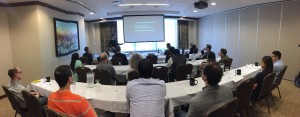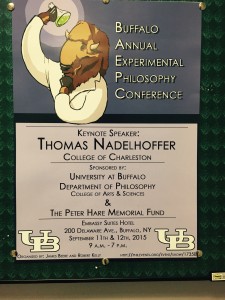Buffalo Annual X-Phi Conference 2016
This last weekend Buffalo hosted its annual x-Phi Conference. Helen De Cruz served as keynote, delivering a great talk on cognitive science/xPhi in philosophy of religion. Major take-aways: 1) phil of religion, more than other fields of philosophy, presently seems like an empty performance of group identity, where philosophers go to argue positions they, but not others, find forceful, 2) phil of religion, as many people understand it, is a fairly dull affair that could be more interesting, 3) phil of religion is a rich place for philosophers generally to find inspiration, and 4) phil of religion is dominated by Christian theists and their detractors (and is even more white and male than philosophy generally).
One of the interesting things I noticed at this conference vs. previous conferences is the incorporation in a number of talks of qualitative methods (e.g. semi-structured interviews) in presentations, in addition to survey methodologies. This led to some interesting conversations about these methods may (or may not) be helpful.



 The Annual Buffalo Experimental Philosophy Conference kicked off yesterday with some great talks and an excellent poster session. I’m struck every year by the workshop-feel of the conference, a feeling that continues to persist despite the conference getting bigger than in previous years. I’m also happy to see many more talks in moral psychology alongside talks on epistemic modals and knowledge attribution. Thanks to all those
The Annual Buffalo Experimental Philosophy Conference kicked off yesterday with some great talks and an excellent poster session. I’m struck every year by the workshop-feel of the conference, a feeling that continues to persist despite the conference getting bigger than in previous years. I’m also happy to see many more talks in moral psychology alongside talks on epistemic modals and knowledge attribution. Thanks to all those who provided helpful feedback on my work on folk judgments concerning promises.
who provided helpful feedback on my work on folk judgments concerning promises.